Articles of 2009
KRONK Comeback! Starring Johnathan Banks
Blue Lewis was an old-fashioned kind of guy and Emanuel Steward is surely glad of it.
Had Lewis been a bit more liberal minded, Steward might not be standing in Banks’ corner tonight when Banks tries to become the first Detroit product of the legendrey Kronk Gym to win a world title since 1985. That’s a 24-year drought for the Motor City and for Steward, whose gym once boasted homegrown heroes like Thomas Hearns, Hilmer Kenty, Milton McCrory and Jimmy Paul all wearing Kronk’s distinctive red, blue and gold colors.
Although Steward has trained some of boxing’s biggest names in the days since Kronk ceased to be synonymous with boxing supremacy, it has been a long time since someone from the neighborhood won a world title, as Banks will try to do tonight on SHOWTIME’s “ShoBox: The New Generation’’ (11 p.m. Eastern). If he upsets IBF cruiserweight champion Tomasz Adamek, there would be a grand footnote to it all because Steward would owe his presence and Kronk’s latest revival to Lewis’ old-fashioned ways.
Banks first began boxing not at the Kronk Gym but at the Brewster Center, another well known Detroit boxing haunt where Lewis was a trainer. Banks’ grandfather lived only six blocks away from 5555 McCraw, where Kronk called home for more than three decades, but when Banks decided to give boxing a try at 14 he had no idea where Kronk was.
All he knew was it was a famous place with a lot of fierce fighters more polished than he, so he decided to see what Blue Lewis had to offer. Once a heavyweight contender adept enough to fight Muhammad Ali for the title in Dublin, Lewis didn’t open his gym on Saturdays so the first day Banks showed up the door was locked. He should have known then something was up with the place but Banks was undaunted, walking back on Monday intent on trying a sport he believed might be his calling. Turns out he was right, although Lewis cared less about that than he did about what he viewed as decorum in the work place…or at least the working out place.
“I went to Brewster for individual attention,’’ Banks recalled. “I walked there. I had played basketball and football and ran track but I begged my mother to let me box every day. I couldn’t wait.
“I couldn’t believe all the guys who were in there. I said when I went in there that one day all those guys will respect me as a fighter. I said the same thing later, when I first went to Kronk.’’
That changeover came about a year after first meeting Blue Lewis. Banks, then 15, had fought 10 times in small amateur shows by then and was already showing promise. Each time he fought he hoped his mother would come. She steadfastly refused, never too sure this boxing idea was a wise one in the first place.
Finally, she worked up the nerve only to learn from her son that women weren’t welcome at the Brewster Center. Soon there after, Johnathon Banks made a decision.
“I ended up at Kronk because I got kicked out of the Brewster Center,’’ Banks recalled. “My mother had never seen me fight but one day she said she’d worked up enough nerve. When I told Blue he said women weren’t allowed in the gym. I told my Mom and she said, ‘I can’t come see my own son fight? Then you ain’t allowed to fight.’
“I’m 15. I told Blue if she can’t come I can’t fight. All Blue kept saying was, ‘I can’t believe this.’ I was hurt by that. He was the only trainer I ever knew. That was in 1998 or ’99. That’s when I walked through The Door.’’
“The Door’’ was the battered old red one that separated the civilian world from the jungle in the basement of 5555 McGraw. On it was a sign that read: “This Door Has Led Many to PAIN and FAME.’’ It was the door through which 50 amateur champions, 30 world champions, three Olympic gold medalists and one Hall of Fame trainer had walked through.
It was a door that offered hope and pride to Johnathon Banks but also well-deserved worries, too.
“I was nervous when I first went to Kronk,’’ Banks said, a decade later. “That door, man. My first day I saw all these guys there like Michael Moorer (the former heavyweight and light heavyweight champion). Good guys. Bad guys. You smelled pain in that basement. You smelled victory and defeat in there.
“Ten people would jump into the ring for a spot to spar. It was like living in a hick town and then moving to New York. Kronk was the big city.’’
Kronk was also where Banks met Steward, a Hall of Fame trainer with a big reputation and an outsized personality. Together they began a process that would lead him to be ranked No. 8 in the world by the IBF with a 20-0 record and 14 knockouts.
It was in that gym that Johnathon Banks found Javan “Sugar’’ Hill, Steward’s nephew and Banks’ trainer these days. Together with Steward, who manages him and in whose home he lived for three years before recently moving into his own place, they developed Banks while he began to develop himself.
“I didn’t think I had no major talent,’’ he said. “I just knew I wanted to do it and I figured I’d fight guys with more talent but if I wanted it more I’d win.
“Emanuel told me I had natural feel for knowing where the punches were coming from. That seemed like a good thing to have. I didn’t know if it was true but I believed him. Emanuel had pictures of all his champions on the wall. I just wanted to be up on that wall.
“At first they weren’t going to let me box because I wasn’t from the East side. All the world champions from Detroit were from the East side. My first amateur loss had been to a Kronk fighter. I knew I beat the guy. Everyone knew I beat the guy but he was Kronk and he got the decision.
“The thing was I never had the Olympic dream until I was 19 and about to turn pro. Emanuel said he thought I was the best amateur light heavyweight in the country. I really didn’t know nothing about the Olympics. I made it to the 2004 Trials but I had so much trouble making weight. I weighed 178 when I weighed in and the next day I was back to 195. My body was growing so I wasn’t terribly disappointed when I didn’t make the team. I knew with my style I was better suited for the pros.
“The amateurs have that pitty-pat style. I wanted to knock people out. I wanted to hurt people. At Kronk that was the thing. It’s an instinct in you. Everybody has an instinct. Some is to run away. Some is to walk away. Some is to fight. Mine is to knock people out.’’
That he has done but Friday night his apprenticeship is over. He will be in with a former light heavyweight champion with only one loss on his record, when he was outpointed by Chad Dawson. That cost Adamek the 175-pound title, but he moved up to cruiserweight and 11 weeks ago won the IBF belt with a split-decision victory over Steve Cunningham in a fight in which he dropped Cunningham three times.
Whether Banks is ready for the kind of competition he will get from the hard core Adamek remains to be seen but he has certainly learned from Eliseo Castillo (20-1-1 at the time) that adversity is always never far away inside a boxing ring. Banks’ entire family was on hand to watch his first big professional fight outside of Michigan when he took on Castillo and it had barely begun when they looked up and he went down.
“I was shocked,’’ admitted Banks of the first knockdown of his career. “Mentally I gave him his props but I felt, ‘Now it’s my turn to see if you can take my thing.’ I was more shocked after the fact. I was blown out of my mind. This dude knocked me down in front of my Mom? My family had driven from Detroit to New York and I’m on the canvas?
“My sister was crying but I didn’t panic. I just knew I had to get the guy. In that situation whatever your true instinct is will show. If you’re a coward it will show. If you’re a fighter, you get up.’’
Banks had to do that twice in the first round and he did. Then he stayed up and did what his instincts always told him to do. He fought back.
“That fight increased my confidence,’’ Banks said of his fourth round KO victory over Castillo. “I judge myself by the things I go through. You can’t say you got heart until you’re tested.
“After that fight Tommy (Hearns, Kronk’s greatest fistic product) hugged me. He said, ‘You did something I could never do.’ That meant a lot to me, Tommy saying that.’’
Boxing is as much about surviving pain as it is inflicting it. If one can do the latter but not the former his career will be short and his successes minimal regardless of his physical talent because boxing is a mental war as well as a brutally physical one.
Can you control the fear and doubts that creep into your head after another man has sent you to the floor in front of your family or will you fold up, broken in spirit as well as in body? Banks and Steward both believe those questions have been answered.
“That night he showed the kind of fighter he is,’’ Steward said of Banks. “You don’t want to see your guy hurt or on the floor but you know it’s going to happen. It’s what happens next that decides who he is. We saw who Johnathon was.’’
In the opinion of many, he was a future champion, a Kronk champion. Tonight he has the opportunity to prove it.
“There’s a responsibility to being a Kronk fighter,’’ Banks said. “When we show up it means trouble. Somebody is going to get hurt. Somebody is going to get knocked out. That’s how that label rolls. There ain’t no walkovers against a Kronk fighter.
“Emanuel has had so many world champions and I want to be one of them. I think about it all the time. I want to be the best at my craft. When they talk about the best cruiserweights I want my name to be mentioned. That takes some time.
“(Evander) Holyfield is considered the best cruiserweight there ever was. If my name is mentioned one day in that category then I did a good job.’’
If he does a good enough job to defeat Adamek (36-1, 24 KO) it will bring Banks full circle. He will have completed his journey from Blue Lewis’ gym to what Kronk was always about. He will be their newest champion and the title would be more than simply something the IBF bestowed on him. Johnathon Banks would be the champion in the gym of champions and a champion to all of Detroit. He’d be the champion of Kronk.
“He would be the first homegrown Kronk kid to win a world title since 1985,’’ Steward told a SHOWTIME interviewer recently. “I’ve talked to Johnathon about that and he’s using it as a big motivating factor. We’re talking almost 25 years!
“That’s when we had kids coming out of Kronk like crazy and Johnathon fits in that group. He knows if he wins this fight he will be the guy and that when he goes to the mall there will be people who want to touch him and meet him.’’
There will be such a person waiting for him tonight as well. A guy with bad intentions who wants to touch him in ways designed to separate his mind from his body but at least he’ll let Banks’ mother watch. If Johnathon Banks’ hand is raised around midnight, Blue Lewis will have wished he felt the same way.
-

 Featured Articles3 weeks ago
Featured Articles3 weeks agoThomas Hauser’s Literary Notes: Johnny Greaves Tells a Sad Tale
-
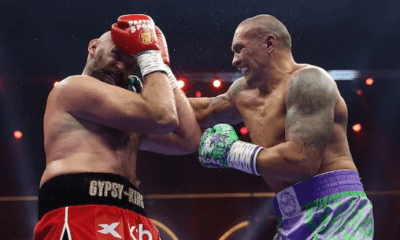
 Featured Articles2 weeks ago
Featured Articles2 weeks agoBoxing Notes and Nuggets from Thomas Hauser
-
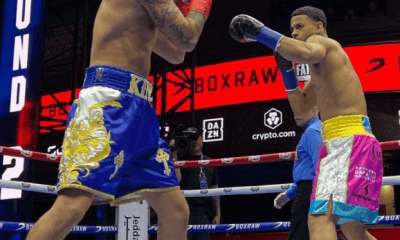
 Featured Articles4 weeks ago
Featured Articles4 weeks agoRolly Romero Upsets Ryan Garcia in the Finale of a Times Square Tripleheader
-
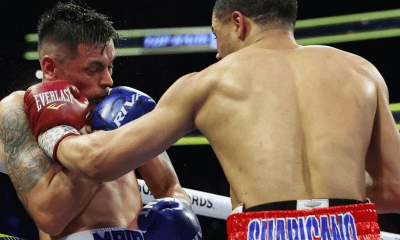
 Featured Articles4 weeks ago
Featured Articles4 weeks agoUndercard Results and Recaps from the Inoue-Cardenas Show in Las Vegas
-
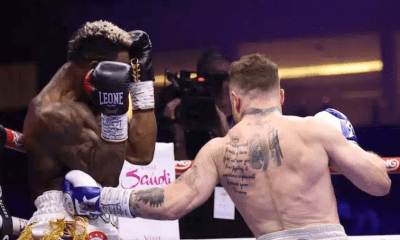
 Featured Articles4 weeks ago
Featured Articles4 weeks agoCanelo Alvarez Upends Dancing Machine William Scull in Saudi Arabia
-
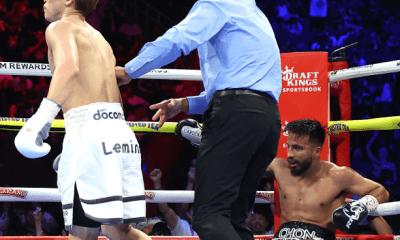
 Featured Articles4 weeks ago
Featured Articles4 weeks agoBombs Away in Las Vegas where Inoue and Espinoza Scored Smashing Triumphs
-
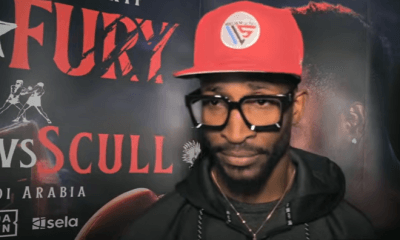
 Featured Articles4 weeks ago
Featured Articles4 weeks agoArne’s Almanac: The Good, the Bad, and the (Mostly) Ugly; a Weekend Boxing Recap and More
-
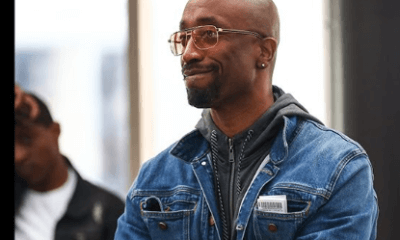
 Featured Articles3 weeks ago
Featured Articles3 weeks ago“Breadman” Edwards: An Unlikely Boxing Coach with a Panoramic View of the Sport


















